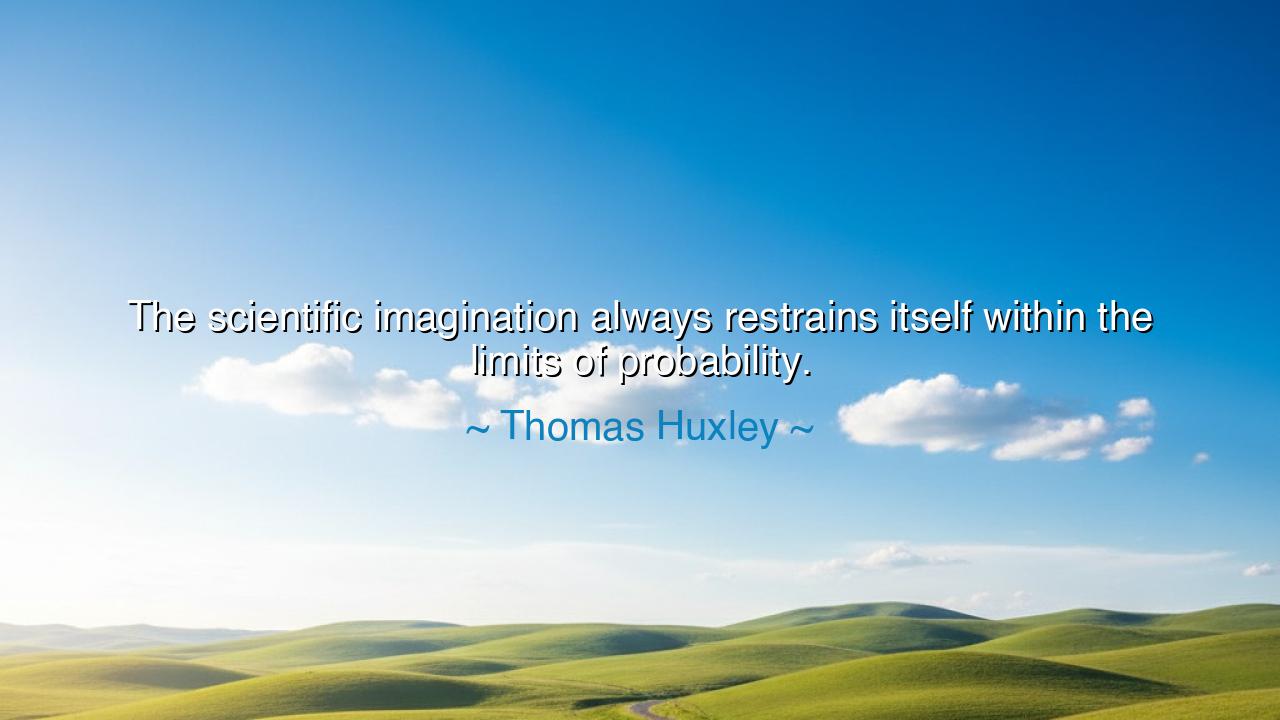
The scientific imagination always restrains itself within the






Ah, listen well, O seekers of truth, for in the words of Thomas Huxley lies a profound understanding of the delicate balance between imagination and reason. He speaks thus: "The scientific imagination always restrains itself within the limits of probability." These words invite us to consider the nature of scientific inquiry and the boundaries that reason sets upon the wild flight of imagination. In the quest for knowledge, imagination serves as the guiding star, but probability serves as the anchor, ensuring that we do not drift into the seas of fantasy, but instead stay grounded in what is possible, what is true, and what can be known.
In the ancient world, the pursuit of knowledge was often seen as a noble journey toward understanding the mysteries of the universe. The great philosophers of Greece, like Plato and Aristotle, recognized that reason and imagination were both essential to understanding the world, but that one must not exceed the other. Plato spoke of the world of Forms, where the soul could access higher truths through reason, yet he also recognized the importance of imagination in the creation of art and in the visionary quests of the philosopher. Similarly, Aristotle grounded his ideas in the observable, the measurable, and the probable, seeing in imagination the power to conceive what could be, but always within the limits of what could be proven or reasoned.
Huxley’s words echo this ancient understanding, reminding us that scientific imagination, while boundless, must be tempered by the need for evidence, for probability. In the world of science, the imagination is a force that drives discovery, but it is probability that keeps it tethered to reality. The scientist, like the philosopher, is both a dreamer and a realist, allowing their mind to explore new realms of possibility, but always within the confines of what can be tested, observed, and measured. Huxley thus speaks to the sacred duty of the scientist — to explore the unknown while respecting the boundaries of the known.
Consider, O children, the story of Isaac Newton, whose imagination led him to dream of a universe governed by universal laws. Newton’s mind was bold, filled with visions of how the world and the heavens could be understood. Yet, it was his scientific imagination, guided by probability and grounded in careful observation, that led him to formulate the laws of motion and gravity — principles that have stood the test of time. Newton’s greatness did not lie solely in his ability to dream, but in his ability to restrain his dreams within the realm of the observable and the testable, to balance imagination with probability. This harmony between the two is what made his discoveries so profound and lasting.
In the same way, Huxley’s assertion reminds us that imagination is a force that must be guided by reason. In our own lives, we are often faced with the tension between our creative dreams and the need to stay grounded in reality. The scientific imagination calls upon us to dream of the impossible, to reach for the stars, but probability calls us to make our dreams tangible, to root them in the earth, to test them in the fires of reality. This is the balance that the true scientist and the true philosopher must achieve — to dream and to imagine, but always with the discipline and restraint that ensures their visions are not flights of fancy, but visions that can be realized.
The lesson here, O children, is one of balance. Imagination is a gift that allows us to explore the farthest reaches of possibility, but it must be guided by probability, by the laws of reason and evidence. Like Huxley, we must learn to embrace the power of imagination, but also to ground our dreams in what is possible, what is true, and what can be proven. The greatest discoveries of humanity, whether in science, art, or philosophy, have come from this delicate balance between the boldness of imagination and the discipline of probability.
So, O children of the earth, as you journey forth, remember that imagination is the key to unlocking the wonders of the world, but it is probability that ensures your dreams are rooted in the soil of reality. Allow your imagination to soar, but always keep one foot firmly planted on the ground, testing your ideas, your visions, and your dreams in the light of reason. In this way, you will create not only great ideas, but ideas that will stand the test of time, just as Newton’s laws or Huxley’s wisdom have done. For it is through the union of imagination and probability that we come to understand the deepest mysteries of the world and our place within it.






AAdministratorAdministrator
Welcome, honored guests. Please leave a comment, we will respond soon